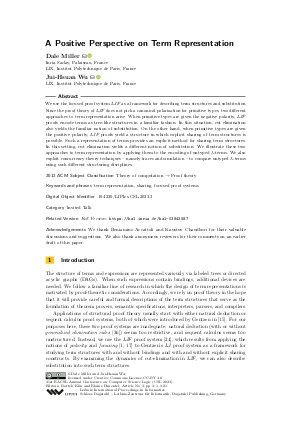@InProceedings{miller_et_al:LIPIcs.CSL.2023.3,
author = {Miller, Dale and Wu, Jui-Hsuan},
title = {{A Positive Perspective on Term Representation}},
booktitle = {31st EACSL Annual Conference on Computer Science Logic (CSL 2023)},
pages = {3:1--3:21},
series = {Leibniz International Proceedings in Informatics (LIPIcs)},
ISBN = {978-3-95977-264-8},
ISSN = {1868-8969},
year = {2023},
volume = {252},
editor = {Klin, Bartek and Pimentel, Elaine},
publisher = {Schloss Dagstuhl -- Leibniz-Zentrum f{\"u}r Informatik},
address = {Dagstuhl, Germany},
URL = {https://drops.dagstuhl.de/entities/document/10.4230/LIPIcs.CSL.2023.3},
URN = {urn:nbn:de:0030-drops-174648},
doi = {10.4230/LIPIcs.CSL.2023.3},
annote = {Keywords: term representation, sharing, focused proof systems}
}

 Creative Commons Attribution 4.0 International license
Creative Commons Attribution 4.0 International license
